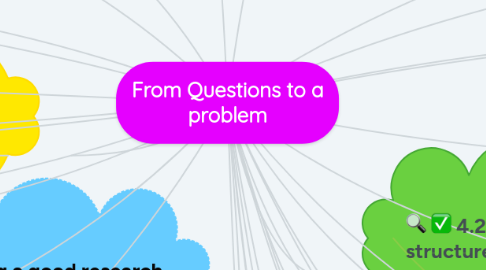From Questions to a problem
作者:Yisell Romero


1. 4.3 Finding a good research problem.
1.1. A problem whose solution makes all of us see the world in a new way.
1.2. It’s easy to recognize a good problem when we bump into it, or it bumps into us.
2. 4.4 Learning to work with problems.
3. Ask for help
4. Look for Problems as You Read
5. Look at Your Own Conclusion
6. Find a new problem that encourages the researcher.
7. Practice mental habits.
8. Do more that just accumulating and reporting facts.
9. formulate a question that you think is worth answering.
10. Find a problem (question) that others think is worth solving.
11. You risk the worst response a researcher can get: not I don’t agree, but I don’t care.
12. The ability to recognize a problem is valued.
13. Articulate it in a way that convinces others both to care about it and to believe it can be solved.
14. Developed By Jhon Cuellar Jorge Rey Daniel Tacuma Katherine Ortiz Karen Romero Steven Marín
15. Here it is. 1401 east, 55th street.
16. Can I find a brake shop in the yellow pages to fix them?
17. My brakes are screeching!
17.1. Drive over to get them fixed.
18. If you think that the solution to your conceptual problem might apply to a practical one, formulate your problem as the pure research problem it is, then add your application as a fourth step
18.1. 1
18.1.1. Topic
18.1.2. Conceptual Question
18.1.2.1. Conceptual Signifi cance
18.1.2.1.1. Potential Practical Application
19. conceptual question to make it seem more significant
19.1. Topic
19.1.1. Research Question:
19.1.1.1. Potential Practical Significance:
20. Connecting a Research Problem to Practical Consequences
21. “Pure”
21.1. 1. Topic
21.2. 2. Question
21.3. 3. Significance
22. “Applied”
22.1. 1. Topic
22.2. 2. Question
22.3. 3. Significance
23. Distinguishing “Pure” and “Applied” Research
24. Condition
25. Nature of practical problems
26. Consequence
27. Cost
28. Nature of Conceptual Problems
29. Undesirable consequences
30. Situation or condition
31. Practical & conceptuals problems
32. Same structure
33. 4.1 Distinguishing practical and research problems
33.1. Researchers must answer a general question that interests everyone.
33.1.1. Practical problem:
33.1.1.1. To solve by doing something.
